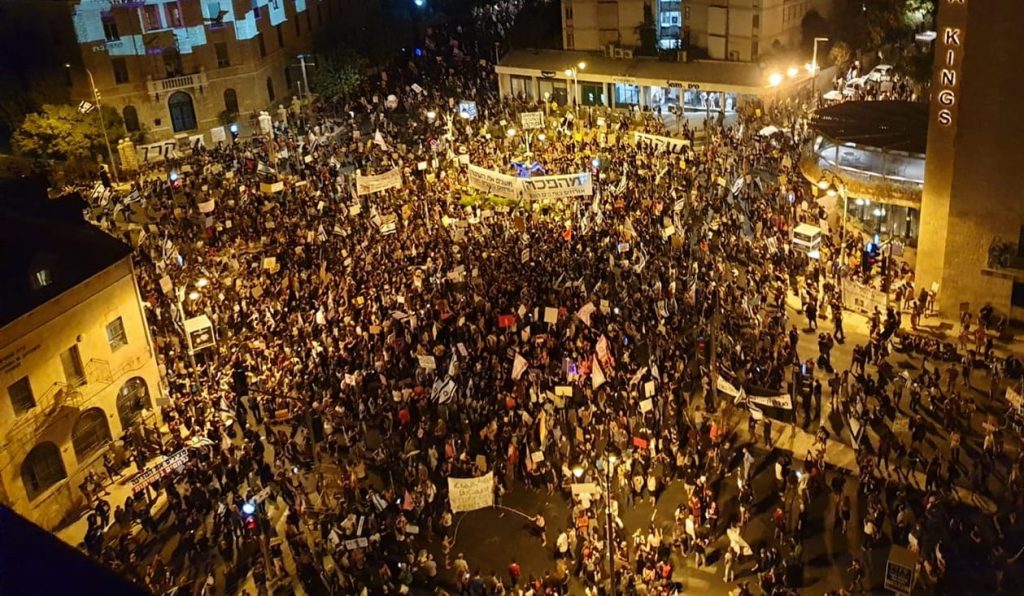Police arrested 11 anti-government demonstrators in Jerusalem on Sunday night, September 20, during the first major protest since Israel started its second nationwide lockdown to curb its surging coronavirus outbreak. The new lockdown regulations continue to permit protests, subject to Ministry of Health recommendations and police instructions.

Thousands gathered in Jerusalem’s Paris Square for the first major anti-Netanyahu protest since the start of new lockdown, Sunday evening, September 20. (Photo: Crime Minister)
Several thousand demonstrators, among them activists from Hadash and the Communist Party of Israel, gathered for the weekly protest against far-right Prime Minister Benjamin Netanyahu outside his official residence in Jerusalem. Several hundred more protested outside the prime minister’s private residence in the seaside town of Caesarea. In parallel, more than one hundred Black Flags protests took place at main overpasses and intersections throughout the country.
At around 9 pm, the driver of a private vehicle raced towards the Jerusalem protesters in his car, almost ramming into them. Police said they had “arrested a suspect who drove towards the police barricades and constituted a danger to both protestors and police.” Video posted to social media showed a white Mini Cooper car coming to a screeching halt as officers called on the driver to stop, some of them with their guns drawn. Protesters attending the demonstration at the prime minister’s Jerusalem residence on Balfour Street submitted a complaint to Israel Police against Netanyahu advisors Topaz Locke and Ofer Golan for violating self isolation orders to document the demonstration. The two had returned with the PM’s delegation from Washington DC earlier in the week, making them subject to self-isolation regulations.
On Friday, September 18, Israel police announced new regulations governing protests during the three-week lockdown, with demonstrators to be divided into “clusters” of 20, maintaining social-distancing within and between the clusters. Prior to the Sunday night Jerusalem demonstration, pushed back a day until the close of the Jewish New Year holiday, police officers deployed a yellow barricade tape in an attempt to divide Paris Square, the regular site of the demonstrations, into capsules to ensure social distancing. However, police did not physically enforce the measures as the new guidelines are currently only a recommendation and have not yet been approved by the government. About two hours into the protests, the system had already fallen apart. As far as the crowd was concerned, Sunday night’s protest seemed about the same as all the others in Jerusalem during the last three months.
On Saturday morning, September 19, around 200 people gathered at a Tel Aviv beach to protest against the lockdown restrictions, which many have decried as illogical, and to demonstrate against Netanyahu. “Demonstrations are the lifeblood of democracy,” Crime Minister, one of the protesting organizations, announced on Sunday. “We all have a fantastic record of keeping the protesters healthy each week and there have been no sign of morbidity among the demonstrators. We hope the police, which has squashed us like sardines until now, will help by moving back and withdrawing its blockades to allow us to spread out.”


